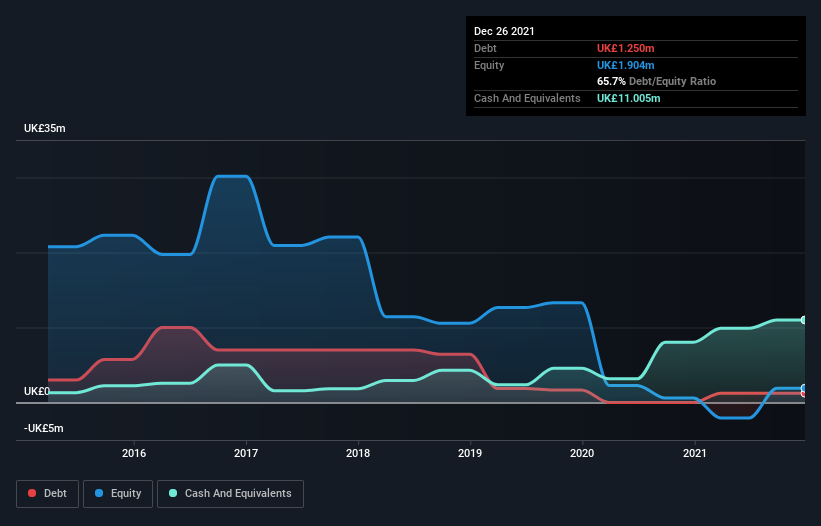Legendary fund manager Li Lu (who Charlie Munger backed) once said, 'The biggest investment risk is not the volatility of prices, but whether you will suffer a permanent loss of capital.' So it seems the smart money knows that debt - which is usually involved in bankruptcies - is a very important factor, when you assess how risky a company is. Importantly, Tasty plc (LON:TAST) does carry debt. But is this debt a concern to shareholders?
When Is Debt A Problem?
Debt assists a business until the business has trouble paying it off, either with new capital or with free cash flow. Part and parcel of capitalism is the process of 'creative destruction' where failed businesses are mercilessly liquidated by their bankers. However, a more usual (but still expensive) situation is where a company must dilute shareholders at a cheap share price simply to get debt under control. Having said that, the most common situation is where a company manages its debt reasonably well - and to its own advantage. The first thing to do when considering how much debt a business uses is to look at its cash and debt together.
View our latest analysis for Tasty
What Is Tasty's Net Debt?
You can click the graphic below for the historical numbers, but it shows that as of December 2021 Tasty had UK£1.25m of debt, an increase on none, over one year. However, it does have UK£11.0m in cash offsetting this, leading to net cash of UK£9.76m.

A Look At Tasty's Liabilities
Zooming in on the latest balance sheet data, we can see that Tasty had liabilities of UK£12.8m due within 12 months and liabilities of UK£51.5m due beyond that. Offsetting this, it had UK£11.0m in cash and UK£211.0k in receivables that were due within 12 months. So its liabilities total UK£53.1m more than the combination of its cash and short-term receivables.
The deficiency here weighs heavily on the UK£7.76m company itself, as if a child were struggling under the weight of an enormous back-pack full of books, his sports gear, and a trumpet. So we'd watch its balance sheet closely, without a doubt. At the end of the day, Tasty would probably need a major re-capitalization if its creditors were to demand repayment. Given that Tasty has more cash than debt, we're pretty confident it can handle its debt, despite the fact that it has a lot of liabilities in total. The balance sheet is clearly the area to focus on when you are analysing debt. But it is Tasty's earnings that will influence how the balance sheet holds up in the future. So when considering debt, it's definitely worth looking at the earnings trend. Click here for an interactive snapshot.
Over 12 months, Tasty reported revenue of UK£35m, which is a gain of 44%, although it did not report any earnings before interest and tax. Shareholders probably have their fingers crossed that it can grow its way to profits.
So How Risky Is Tasty?
Although Tasty had an earnings before interest and tax (EBIT) loss over the last twelve months, it made a statutory profit of UK£1.2m. So taking that on face value, and considering the cash, we don't think its very risky in the near term. One positive was the revenue growth of 44% over the last year. But we genuinely do think the balance sheet is a risky. When analysing debt levels, the balance sheet is the obvious place to start. But ultimately, every company can contain risks that exist outside of the balance sheet. To that end, you should be aware of the 2 warning signs we've spotted with Tasty .
At the end of the day, it's often better to focus on companies that are free from net debt. You can access our special list of such companies (all with a track record of profit growth). It's free.
Valuation is complex, but we're here to simplify it.
Discover if Bow Street Group might be undervalued or overvalued with our detailed analysis, featuring fair value estimates, potential risks, dividends, insider trades, and its financial condition.
Access Free AnalysisHave feedback on this article? Concerned about the content? Get in touch with us directly. Alternatively, email editorial-team (at) simplywallst.com.
This article by Simply Wall St is general in nature. We provide commentary based on historical data and analyst forecasts only using an unbiased methodology and our articles are not intended to be financial advice. It does not constitute a recommendation to buy or sell any stock, and does not take account of your objectives, or your financial situation. We aim to bring you long-term focused analysis driven by fundamental data. Note that our analysis may not factor in the latest price-sensitive company announcements or qualitative material. Simply Wall St has no position in any stocks mentioned.
About AIM:BOW
Moderate risk with adequate balance sheet.
Market Insights
Community Narratives





